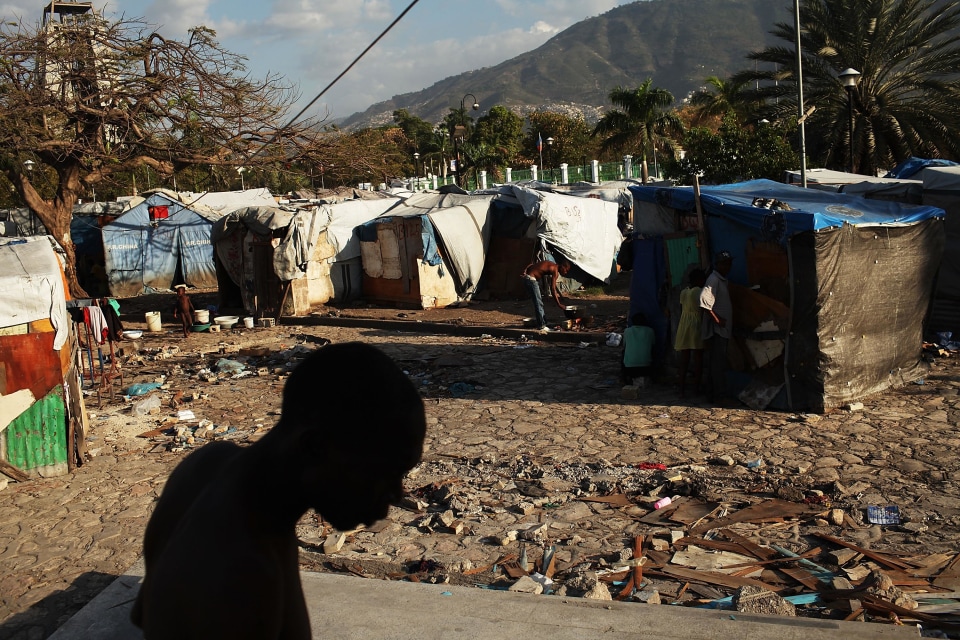By Kathryn Maureen Ryan
Impunity Watch, Managing Editor
PORT–AU–PRINCE, Haiti – Five years ago, on a sunny Tuesday afternoon, a devastating 7.3 magnitude earthquake devastated The Haitian capital of Port-Au-Prince and the surrounding community, destroying entire communities and claiming the lives of about 220,000 people. The quake, which also created 1.5 million internally displaced peoples, was the most devastating natural disaster in modern North American history. Five years after the deadly earthquake Haiti is still struggling to recover, at least 80,000 Haitians continue to live without a “proper roof” over their heads and many Haitians fear that the Haitian government and international community’s “Build Back Better” campaign is failing and the members of the international community have not been held accountable for mistakes made in Haiti even as Haitians continue to suffer.

Billions of dollars were donated and pledged by state government, NGOs, private corporations and private citizens, to rescue, recover and rebuilding process in Haiti during the days and months that followed the Earthquake. In the United States alone tens of millions of dollars were raised by the American Red Cross through a texting campaign that allowed cellphone users to donate ten dollars to the Red Cross by sending a text message. However, five years after the quake many are asking where the billions pledged to rebuild Haiti have been spend. According to the United Nations in total $13.34 billion has been earmarked for the crisis through 2020, though two years after the quake, less than half of that amount had actually been released, according to U.N. documents.
The United States government has allocated $4 billion; $3 billion has already been spent, and the rest is dedicated to longer-term development projects. The Haitian government reports that 90% of the refugee camps established after the devastating quake have been destroyed and its residents have found more permanent housing. However, nearly 80,000 live day to day without a proper roof over their heads and according to the International Organization for Migration. Many of these people live in displacement camps. Private land owners in Haiti have forcibly evicted homeless quake victims who they see as illegally squatting on their land. “Although we are happy to report on the fifth anniversary of the earthquake that IOM has registered a 94 per cent decrease in the number of Haitians displaced, and a 93 per cent decrease in the number of sites still housing displaced populations, the international community must not forget the almost 80,000 persons that continue to wait for their chance to rebuild their lives with a proper roof over their heads,” said Gregoire Goodstein, International Organization for Migration Chief of Mission in Haiti.
In the months after the Haitian Earthquake the country was struck by an outbreak of Cholera that killed more than 8,000 people and sickened more than 700,000 since human waste was dumped into Haiti’s principal river in October 2010. Scientific studies have concluded that cholera was likely introduced to Haiti by United Nations peacekeepers from Nepal, where the disease is endemic. Haiti has called for the United Nations to be held liable for introducing the disease to Haiti and have called on the United Nations to step up its efforts to fight the deadly disease and provide for survivors. Last Friday a case seeking compensation for the victims of the outbreak was through out of court in the United States. Judge J. Paul Oetken argued that the UN’s charter provides broad legal immunity and that the international body has not waived it. “Where such an express waiver is absent, the United Nations and [its operation in Haiti] are immune from suit,” Oetken wrote. The United Nations has repeatedly declined to comment on the lawsuit but has said it is working with Haiti’s government to eradicate cholera. In December 2012, United Nations Secretary-General Ban Ki-moon announced a $2.27bn initiative to help eradicate cholera in Haiti.
For more information please see:
NBC News – What Does Haiti Have To Show For $13 Billion In Earthquake Aid? – 11 January 2015
CNN International – Five Years after the Quake: Haiti at a Crossroads – 12 January 2015
Al Jazeera – UN ‘Immune’ From Haiti Cholera Lawsuit – 10 January 2015
International Organization for Migration – Five Years after 2010 Earthquake, Thousands of Haitians Remain Displaced – 9 January 2015
